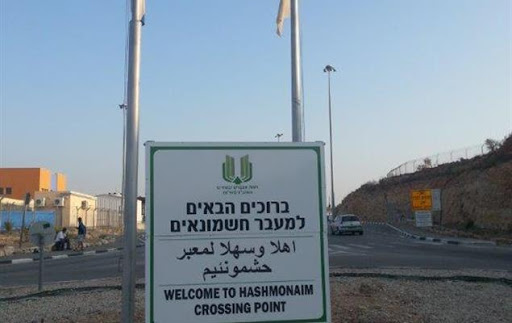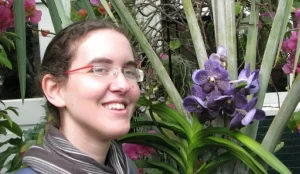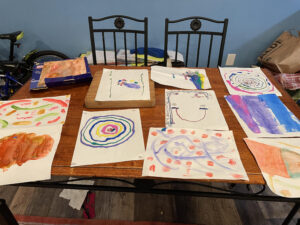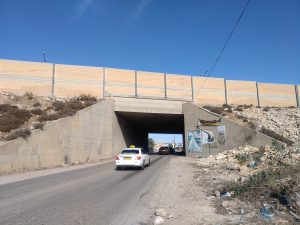We waited for hours, the children and I on one side of the checkpoint, Osama on the other, hoping to make it to the airport.
Cleaning the refrigerator
“I knew you would clean again after I finished,” Osama said, and peered into the refrigerator, offended.
“I made a new year’s resolution,” I said as I wiped away crumbs from the corner of the shelf. “I will continue to vacate apartments in excellent condition, and I will forgive the people who leave us dirty apartments to move into.”
“For my sake, please don’t do such a good job,” he asked. “It’s two o’clock.”
Our flight to the United States was due to leave at midnight. I reminded Osama that we were on schedule, but he wasn’t reassured: “You’re assuming everything will go well,” he said.
For the first time, Osama, the children and I were to travel abroad together, after Osama got a rare permit to travel via Ben Gurion Airport, for a sabbatical year in North Carolina.
Baba will cross on foot, because he’s Palestinian
We picked up the children from friends and drove to the Na’alin checkpoint, inside the West Bank, near the Israeli settlement of Modi’in Ilit. Osama got out of the car to walk across the checkpoint, and the children and I drove to the settlers’ vehicular crossing. Three year-old Adam cried when Osama left.
“No, Adam, Baba’s coming back,” said his sister, six year-old Forat. “He’ll cross on foot and meet us on the other side, because he’s Palestinian.”
The guard from the private security company passed me through with a wave of her hand, without even checking my accent. On the other side of the checkpoint, I parked in a lot filled with minivans waiting to take Palestinian workers to their jobs in Israel the following morning. Twenty minutes later, Osama called. His voice was terrible.
“They won’t let me cross,” he said. “They told me, ‘corona closure’.”
“Did you show them the permit?”
“Yes. I made it to the last stage, and then they looked at the computer and sent me back. Aggressively.” My stomach turned over.
“Wait,” I told him. “Let me check.”
“Maybe you should come back, and we’ll try another checkpoint?”
“Wait.”
I called my colleague, Idit, a lawyer who had helped us get the permit. She didn’t answer. I called an officer in the Israeli army’s civil administration, who had once helped me. He didn’t answer. Forat and Adam were hitting each other in the back seat. I asked them to walk with me to the checkpoint. I didn’t want to drive back across, for fear they would associate me with Osama and search the car. The last time that happened, the search took two hours.
Outside, in the dark parking lot, a bitter wind whipped at my face and almost blew Adam sideways. It was seven fifteen. As we approached the inspection area, a security guard stopped us, startled.
“Halt! What are you doing here?”
I asked to speak with the officer in charge of the checkpoint. Cars whizzed past us on the dark road.
“Adam!” I yelled. “Stay on the sidewalk!”
Dror, the checkpoint manager, shared my anxiety about the children’s proximity to the road and walked us to a bus stop where the children could sit. But he was adamant about their father.
“He has a coronavirus block,” Dror said. “Only the District Coordination Office in Beit El can remove it.”
“But he doesn’t have the coronavirus,” I protested.
“No, that has nothing to do with it,” Dror said. “They impose the block on a lot of people. But only the District Coordination Office can remove it.”
Idit called me back and sounded uncharacteristically worried. “It’s a big problem,” she said. “To remove a coronavirus block, you have to show a negative coronavirus test. But I’ll try.”
“Forat, stop pushing Adam!” I yelled and pulled them both back to the sidewalk.
“Where’s Baba?” Forat asked. “You said he had a permit.”
Back in the parking lot, the children chased each other, laughing. I thought about the groceries I had ordered from the supermarket in North Carolina, that would arrive tomorrow, three hours after our flight was due to land. I had ordered dairy products that would spoil if left outside our new apartment. And the children were due to start school and preschool there.
I called Osama and updated him. “If it doesn’t work – let’s think whether I should travel alone with the children and wait for you there.”
Adam announced that he had to poop. The toilet in the bathroom was a kind of dirty hole, with no seat. Despite the cold, I undressed Adam outside, under a tree. I gave him confusing instructions, and he peed on his pants. I changed his clothing. Idit called: “I spoke to the most senior officer who would answer me at this hour,” she said. “He said he would try.”
“It’s encouraging that he said he’ll try,” I said and then screamed, “Forat! Get off Adam! His nose is bleeding!”
I put the children into the car and continued my rounds of telephone calls, trying to reach someone in the army who could lift the block. Forat yelled at Adam, and I gave her a bag of Bamba. Adam tried to grab it from her, and she pushed him. He kicked her, screamed, and then crawled into the front seat and put his head on my shoulder. I lifted my head from the telephone screen and suddenly remembered that he was three years old and very, very tired. Osama called: “Sweetheart, it’s too much for you and the kids. Bring me my suitcase. Imad will pick me up.”
Adam heard Osama’s voice and started to cry. “Baba! Baba!”
I called my brother and asked him to see if he could change Osama’s plane ticket. I tried to put Osama’s things into one suitcase. I cursed myself for the optimism that had led me to pack everything together, as if we would all arrive together. I felt guilty for scrubbing the refrigerator despite Osama’s pleas to leave earlier. I took the children out of the car and started to drag the suitcase toward the checkpoint.
“Carry me!” Adam demanded.
“On the way back,” I promised.
The road was empty. Adam was scared in the dark and clung to me, getting his feet caught in the wheels of the suitcase. Forat cried that it wasn’t fair for me to carry Adam and not her, and why do I love him more than her?
As we approached the checkpoint, Dror came out to meet me.
“Where’s your car?” he asked.
“In the parking lot. I don’t have time for your searches.”
“Don’t worry. I’ll let you drive back immediately. But tell your husband to come back to the checkpoint. We’ll check if it’s resolved in the computer.”
I called Osama.
“I can’t go back,” he said. “They were aggressive. They kicked me out of there.”
“Dror, the checkpoint manager, says it’s OK. Don’t be afraid.”
“Ima, what is Baba afraid of?” Forat asked.
“Baba is afraid the soldiers will be angry at him, but they won’t be angry at him,” I said.
“What do they do when they get angry?”
Suddenly I saw Osama’s silhouette, approaching the vehicle inspection area of the checkpoint, two hundred meters from us. I waited ten minutes, but he didn’t emerge. It was nine fifteen. I was afraid to surprise the security guards, if I were to drag the suitcase to the checkpoint in the darkness. I decided to trust Dror and to bring it to Osama by car.
We returned to the parking lot. I buckled the children into the back seat and then suddenly Osama was running toward us, smiling.
“They let me through!” he yelled. “They let me through!”
“Quick!” I said. “Put the suitcase in the trunk, we don’t have time!”
I opened the car door, and the sound of the children’s crying swept over me. When they saw Osama they went silent and stared. Adam was the first to recover, a huge smile on his face.
“Baba!!!”
Ben Gurion Airport
We were the last ones to board the plane. The flight attendants reminded passengers to keep their masks over their noses and mouths. The children looked for animated movies on the screens in front of them, Osama sitting between them.
“I can’t believe you’re here,” I told Osama. And then I added: “I hate them.”
This post was also published at haaretz.com on January 19, 2021:
https://www.haaretz.com/israel-news/.premium-on-our-way-to-america-a-race-against-time-at-an-israeli-checkpoint-1.9463586




Alhamdulillah! So sorry u all had to go through all that. Can’t wait for your new updates!!
קראתי בדמעות. תודה שאת כותבת, מצפה לפוסט הבא מהצד השני של העולם.. (גם אני כבר לא בצד ההוא של הים התיכון).
Brava! Thank you for your posts it’s people like you that will change thus awful paradigm, The job of good citizens is to keep their mouths open- good job Um Forat
תודה. אגב, מה פירוש השם פורת?
תודה! פורת כמו השם הערבי לנהר בעיראק, נהר פרת. ה״פ״ אינה מודגשת.
I am sorry for your family’s struggle but it the Israelis have a good reasons for being suspicious to Palestinian Arabs.
However, as you discribed your story, it was no animosity from Jews toward Gentile but the precautions and duties for security reasons.
You know that the reasons are substantial!
Additionally, the Jews help you to reunite your family and I am proud for my people in their Human and forgiveness nature in general and in Israelis in particular.
I want to believe that you and your husband should not have any bitterness toward Israel ever but praise the Israel and install the genuine pride of belong to Jews into your children.
Sincerely,
Ilya
מעניין ואישי. עוקב כבר כמה שבועות. המשיכי לכתוב! מאחל לכם המשך מוצלח ופתיחת דף חדש. נסו להישאר בארה”ב! אני אומר זאת כמי שנמצא פה כבר שנים רבות וחושב שזה המקום הטוב ביותר לכל אדם, אבל במיוחד לזוגות מעורבים שכמותם אני מכיר רבים.
אתם בדרך לצ’אפל היל? יש לי שם מכרים, ואני מנהל קבוצת הגירה, צרי קשר אם מתאים לך 🙂
כל סיפור כזה זה בוקס בבטן
רק שיהיה לך כוח
הסיפור שלך מרתק מאוד
כמה קשה לזוגות מעורבים לחיות בשלום וברוגע בו
אל תתיאשי כל עוד את אוהבת אוסמה
והילדים שלך
זה הפוסט השני שכתבת שכבר קראתי
ובשניהם הרגשתי כאב
מאחלת לך לפראת ולאדם ולאוסמה
חיים קלים
מרגש מאד לקרוא.. כואב, מדכא, מטלטל ומחזק תקווה ואמונה!
סקרן אותי לדעת למה בחרת להשתמש בשם “אום פרת” ולא בשם שלך. ופרת זה בת- לא? בתרבות הערבית קוראים לך “אם אדם”-לא? פשוט סקרן אותי לדעת לגבי הבמליות בבחירה שלך
הי רנא,
תודה! בחרתי בשם עט כדי לשמור על פרטיות. פורת זו בת, והיא בת בכורה, נולדה ראשון. נכון, בתרבות הערבית נהוג לכנות את ההורים לפי השם של הבן הבכור, אף אם הבת הבכורה נולדה לפניו. אני רואה בכך אמירה שבנים הם חשובים יותר מבנות, כפי שאני רואה במנהג שמקובל בהרבה מקומות בעולם, להעניק לילדים את שמה של משפחת האב ולא משפחת האם, אמירה שהאב הוא זה שמעניק לילדים השתייכות ומעמד. פורת נולדה לפני אדם ולכן אני גאה להיות אום פורת (וגם גאה להיות אום אדם).
תודה על הקריאה!
אום פורת
קראתי את הסיפור, הכתיבה שלך מרתקת ומעניין להחשף גם לצד הזה של המפה.
נהנתי מהקריאה עד השורה של השנאה.
נתנו לבעל להיכנס על אף החרגות הקורונה , במקום לשמוח ולסיים בצורה אופטימית, ההתנסחות בצורה כזו העכירה את הסיפור חבל.
גם אני נהניתי מאוד, חוץ מהקטע על השנאה בסוף. שנאה זה לא הפתרון לאף בעיה.
תודה!
Major thankies for the blog. Much thanks again. Awesome. Cyril Barcelo